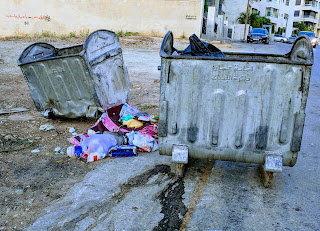Long time readers may
recall this writer’s infatuation with trash and how it gets where it’s going.
I feel like I’ve spoken about it a lot. From looking out my front window,
this is my thoughts about how garbage is handled in Amman once we generate it
and leave it outside of our front door. .All of this is based on hearsay and
observation.
Sulieman our boab,
(house elf) , makes a couple of rounds per day to all the units in our building
collecting garbage and taking it to a set of dumpsters in the vacant lot next
door. This is combined with trash from 8 or 10 other buildings. Dumpsters
are dispersed every 500 feet or so on the main roads. Back streets have a bit longer walk to throw
things away.
A standard city garbage
truck swings by and empties dumpsters 4 or more times per week. I don’t
see them on Fridays, but they can show up most days usually just before dawn,
and just before my alarm is set to ring.
In between collections,
a variety of other visitors happen by the dumpster. It starts with the
cats. I don’t know where they go when
the dumpsters are empty, but when full each dumpster generally has 2 or 3
felines per dumpster. Balanced along the rim or deep inside the garbage.
Sustained on a diet of plastic bags and food scraps. I haven’t seen a lot of
rats, but certainly there must be some.
Bedouins or refugees
make the rounds of the neighborhood. Typically, they have a rusty white
pick up or other utility vehicle that leans to one side, is lacking a muffler
and most functioning forms of illumination. The driver stops, hops out and
grabs a nearby rock to throw under the front wheel to save him having to chase
his car down the hill.
He proceeds to pull
plastic bags out of the dumpster and throw the contents on the ground, taking
what he needs. Usually metal, but also cardboard, cloth and other scraps.
The remainder is scattered to the winds.
The plastic bags take flight. Jordanians call plastic bags, their
national bird.
Glass is not recycled.
And after nearly 2 years of wondering why, I finally learned the answer.
The areas around
dumpsters are strewn with broken glass. I wondered for a while, why glass
wasn’t more valued. We tried for a while to gather glass separately, but
it would be taken to the dumpster and then thrown on the ground.
It turns out that the
closest glass recycling plant was in Syria. After the troubles there, the
border shut down and no one could get the used glass up there, so the market
crashed and no one wanted glass. Another consequence of the ongoing
conflict there.
The ground around the
dumpster, as you can imagine, becomes a bit of a toxic mess of glass, food
scraps and other detritus. Bin Men circulate and sweep and scoop things
up and try and keep things manageable.
Once a month, a front-end
loader drives by and either scoops up trash or grades over it with a thin layer
of dirt and rock and for a week or so, things look rather tidy.
If you want to get rid
of more valuable items, the scrap buyer circulates. A large loudspeaker mounted
on the cab announces what he’s buying. It plays and ear splitting
volumes. He cycles around twice, so when
you hear him the first, you move your stuff to the curb and catch him the
second time around.
Where the collected
trash goes from the dumpster, I’m not sure. I presume to a landfill of
some sort. Some place where all the
“birds’ can roost together and flap in the wind.





